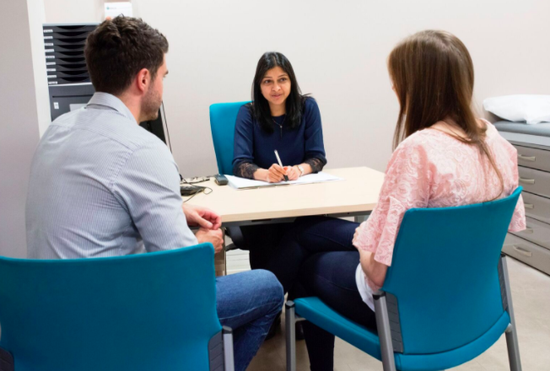If you’ve been trying for a baby and not conceived yet, especially if you’ve been trying for a few months, then you may be wondering if either you or your partner has a fertility problem. Often it’s only when you start trying for a baby and nothing happens that a fertility problem comes to light.
So what do you do?
See your GP
As an initial first step, visit your GP. They will be able to carry out a series of simple tests for both you and your partner to try and indentify any underlying problem which may be the reason you’re not pregnant yet.
Fertility MOT
You can also refer yourself to us for a Fertility MOT. This is a thorough investigation of your fertility and that of your partner, if you wish, including semen analysis and ovarian reserve tests. We can also carry out a Mini MOT, which although not as thorough as the full MOT still gives you a good idea of your fertility status. Fertility MOT is useful if you’re thinking of starting a family but want to know about any issues before you try and conceive.
Get a referral to a Fertility Clinic
If tests show there’s a problem, then you can request that your GP refers you for treatment. Some Primary Care Trusts are now limiting funding for fertility treatment, but if you’re in an area which does offer NHS IVF then remember you can ask that your funding is transferred to a private fertility clinic such as Manchester Fertility, rather than being treated at your local NHS unit.
You can also refer yourself privately to us. You don’t need a referral from your GP to receive treatment from Manchester Fertility. Click here for our self-referral form.
No cause?
If your tests come back clear and there’s no medical reason why you’re not getting pregnant, you could be one of the many couples who have ‘unexplained infertility’. But it could also be that it’s simply taking you a while to get pregnant. Things to consider: are you sure you’re having intercourse at the time of ovulation? Ovulation prediction kits which can be bought easily can help tell you the best time to get pregnant. Remember also that your age can affect how quickly you get pregnant. It also makes sense to ensure both you and your partner are as healthy as you can be – which means things like cutting down on alcohol consumption and smoking.
Consultation
Once you’re under the care of a fertility clinic, then you’ll see one of our consultants who will look at your medical history and tests results, and formulate the most appropriate treatment plan for your needs which has the best chance of success. It may not always be IVF that’s needed.
Above all...
Don’t delay getting help. Infertility is only considered as a medical diagnosis when you’ve been trying for a baby without success for up to two years, but don’t wait if you think there’s a problem. The sooner you get help the better, simply because the younger you are, the better the chance of success. IVF is generally more effective in younger women than older women, because the eggs – which deteriorate in quality as we age - are of better quality.
Last updated: 20th January 2020




